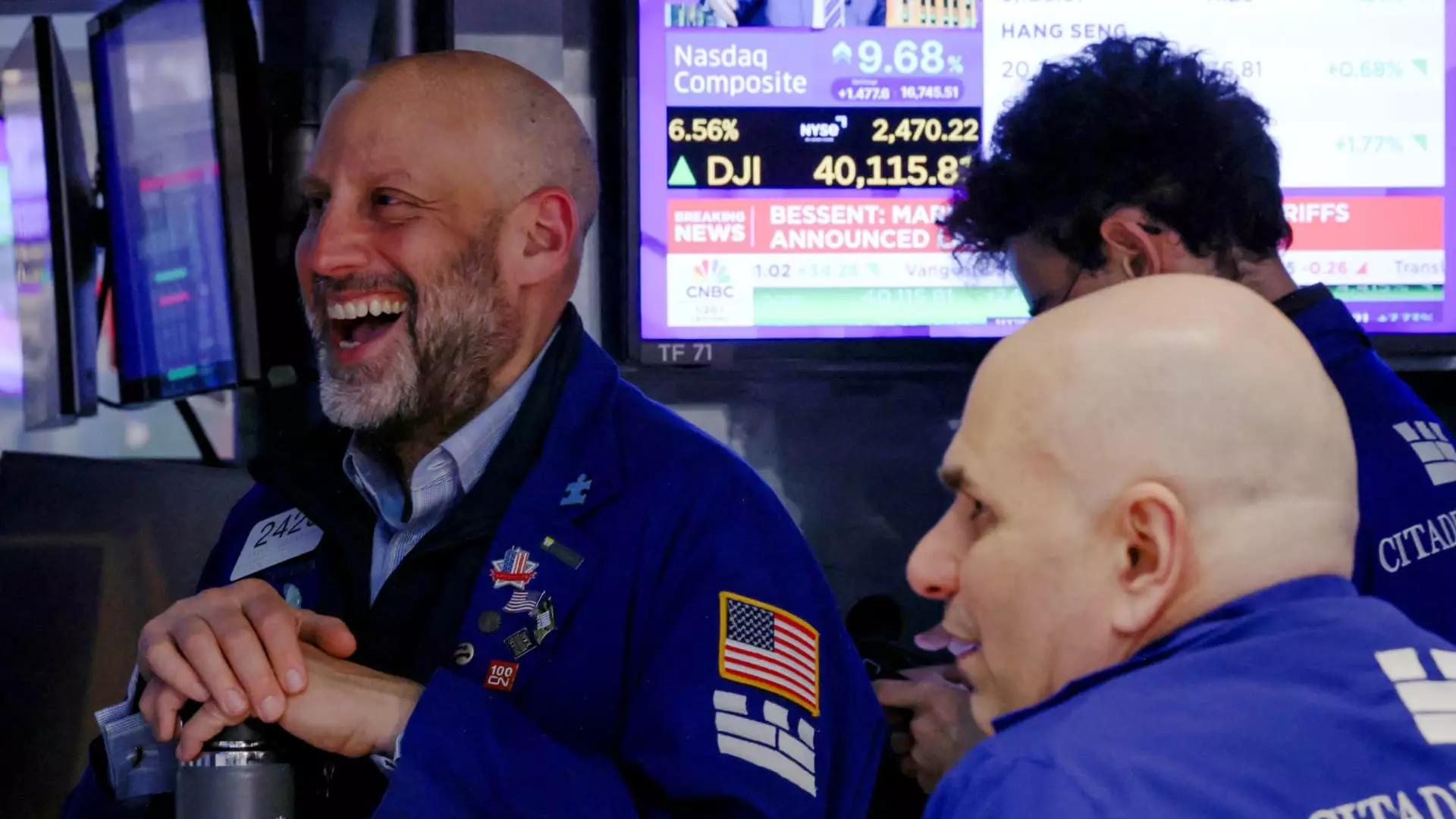The news reverberated across stock exchanges like an electric shock: President Trump announced a pause in the reciprocal tariffs that had been squeezing the market. The immediate response was a surge in stock prices—a buoyant 3,028 points for the Dow Jones Industrial Average, translating to an extraordinary 8% increase. In the midst of continuing trade tensions, small victories can create a ripple effect, demonstrating just how volatile and reactive the market is when fed even a morsel of good news. But let’s not forget the larger context here; can such a temporary announcement truly change the underlying economic dynamics?
Stock market jumps often herald excitement, but this one raises critical questions about its sustainability. The audacious declaration of a 90-day tariff pause does little to mitigate the fact that there is still a looming 125% tariff on China. The positivity inspired by a temporary decision soon confronts an uncomfortable truth: the fierce trade battle is far from over. A glimpse of light can quickly shadow an impending storm, making this rally more akin to a mirage than a genuine economic revival.
Investors: Cautiously Optimistic or Blindly Ignorant?
In the wake of Trump’s announcement, many investors saw their stocks soaring, with tech giants like Apple and Nvidia experiencing jumps of more than 11% and 13%, respectively. This is precisely the dilemma confronting investors: do they bask in the glow of the momentary price rise or prepare for the inevitable fallout from the ongoing trade war? Adam Crisafulli’s comments that this rally offers ‘at least a near-term rebound’ should serve as a clarion call for prudence. It’s a temporary band-aid on the gaping wound of economic uncertainty.
As speculative enthusiasm mounts, what about the traders who lost millions over the past weeks? The prior four-day rout that saw the Dow plunge over 4,500 points cannot simply be brushed aside as another chapter in the market’s tumultuous existence. A market that oscillates so dramatically based on the whims of a single tweet reveals a troubling fragility. Are investors allowing themselves to be swept up in a moment of euphoria, thus ignoring the underlying vulnerabilities?
Tariffs and the Shadow of Uncertainty
Treasury Secretary Scott Bessent’s clarification that only countries other than China would revert to a 10% baseline tariff suggests that the trade war strategy is still firmly grounded in aggression rather than cooperation. This announcement contradicts any notion of a “solution” to the prevailing economic issues. Trade wars aren’t resolved in 90 days; this is merely a tactical retreat, one that is likely to rekindle the flames of discord post-pause.
Moreover, the European Union’s impending set of tariffs against the U.S. serves as an additional reminder of how interconnected and precarious global economies have become. In a world that has become increasingly interdependent, every trade action sends shockwaves across borders, revealing the flaws in an approach that prefers brute force over dialogue. Soccer games have long been an expression of camaraderie, but trade wars have left nations bruised and battered, concerned only with economic wins.
A Glass Half Full or a Ticking Time Bomb?
Trump’s assertion that “now is a great time to buy” presents a mixed message. Is this a rallying cry for cautious optimism, or a reckless invitation to capitalize on volatility? While it’s true that markets thrive on sentiment, they are also shackled by fundamental economic realities. Based on historical patterns, markets recovering from downturns can rapidly slide if sentiments shift again, illustrating a fragile equilibrium.
Moreover, the spectral nature of the trade war raises larger questions about sustainable economic growth. The market’s psychotic swings highlight a longing for stability amongst a backdrop of confusion. If the nature of recovery depends on isolated tariff pauses rather than structural reforms and trade agreements that benefit all parties, the current wave of optimism may simply be a counterfeit recovery that cannot bear the weight of expectation.
Exhilaration in stock prices may distract investors from the critical economic foundations needed for sustained growth. Instead of riding high on a wave of momentary euphoria, perhaps the focus should shift to understanding the deeper implications of trade wars that threaten the very fabric of the global economy.

Leave a Reply